QExactive Plus
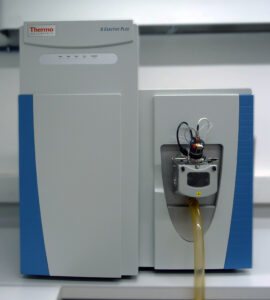
Scientific applications
The Q Exactive Plus is the successor of the Q Exactive. It is a benchtop Quadrupole-Orbitrap mass spectrometer as well and can also be used as a stand-alone instrument or coupled to an HPLC-instrument by ESI. In our laboratory it is employed for analysis of small molecules (e.g. metabolites such as ADP-hexose), for large biomolecules like monoclonal antibodies (mAbs), as well as for targeted and untargeted metabolome and (phospho-)proteome analysis. The higher mass range and higher resolution compared to the Q Exactive, allow for the analysis of highly complex biomolecules (e.g. glycosylated proteins) by native mass spectrometry. The instrument includes HCD and is used for example for sequencing of peptides in large-scale proteomics experiments
Technical specifications
Mass range: 50 to 6000 m/z (License up to 8000 m/z)
Mass accuracy: Internal: <1 ppm RMS and External: <3 ppm RMS
Scan rates: up to 12 Hz, resolution up to 280,000 at m/z 200
QExactive
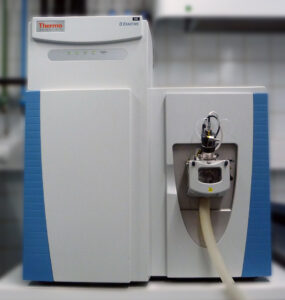
Scientific applications
The Q Exactive is a benchtop Quadrupole-Orbitrap mass spectrometer. It can be used as a stand-alone instrument for direct infusion with electrospray ionization (ESI) or coupled to an HPLC-instrument by ESI. The Q Exactive is a high resolving orbitrap mass spectrometer and allows precursor ion selection by a quadrupole with 0.5 Da mass window. It allows a broad range of scientific applications: In our laboratory it is employed for the targeted and untargeted analysis of small molecules (e.g. metabolites such as UDP-galactose) as well as for large biomolecules like monoclonal antibodies (mAbs). The included higher-energy collisional dissociation (HCD) allows for structural elucidation of molecules and is for example used for the sequencing of peptides and small proteins
Technical specifications
Resolving power: up to 140,000 @ m/z 200 mass range 50 to 6,000 m/z
Scan rates: up to 12 Hz at resolution setting of 17,500 @ m/z 200
Mass accuracy: Internal: < 1 ppm root mean square (RMS), External: < 3 ppm RMS sensitivity
Vanquish Flex
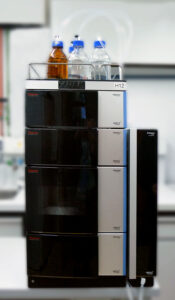
Scientific applications
The Vanquish Flex system has low system dispersion volumes, allowing for high chromatographic resolution power and is used in our lab in combination with mass spectrometry for various proteomics and metabolomics approaches
Technical specifications
System pressure: maximum 1000 bar (100 MPa)
Flow range: maximum: 8 ml/min
pH range: 2 – 12
Column compartment temperature range: 5 °C – 120 °C
Injection volume range: Standard: 0.01–25 μl,
Sample cooling: 4 – 40 °C
Sample capacity (12 mm OD vials): 4 racks of 54 vials (≤ 1.5 ml)
Vanquish Diode Array Detector HL, 190 nm – 680 nm
Vanquish Neo
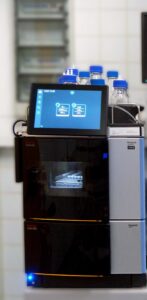
Scientific applications
The Vanquish Neo, like the Vanquish Flex, is one of the most advanced HPLC systems available. Due to its wide flow rate range (1 nL/min – 100 µL/min), the Vanquish Neo system can be used with nano-, capillary- and micro-columns for a wide range of applications. This UHPLC system is particularly suited for high-precision measurements or when small sample volumes are available and is most often coupled to mass spectrometry
Technical specifications
System pressure: maximum 1500 bar (150 MPa)
Flow range: 1 nl/min – 100 µl/min (1 nl increments) – recommended: 100 nl/min – 100µl/min
Biocompatible
pH range: 2 – 10
Active flow control for maximum retention time precision – Thermo Scientific ProFlow XR pump technology
Injection volume range: Standard: 0.01–25 μl
Sample cooling: 4 – 40 °C
Sample capacity (12 mm OD vials): 4 racks of 54 vials (≤ 1.5 ml)
U3000 RSLC
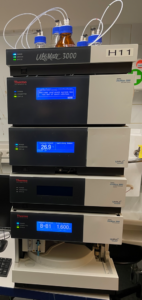
Scientific applications
The U3000 RSLC systems are used with nano-, capillary- and micro-columns for a wide range of applications. This UHPLC system is most commonly coupled to mass spectrometry and is used for protein and peptide separation, biopharmaceutical analysis and metabolomics. It is used for high precision measurements or when small sample volumes are available
Technical specifications
Type: Low-Flow Liquid Chromatography System
Column Temperature Range: Ambient to 75°C
Max. Pressure: Binary High-Pressure Gradient Pump:
Nano flow meter with ProFlow technology: 860 bar
Capillary flow meter: 800 bar
Micro flow meter: 800 bar
Ternary Low-Pressure Gradient Pump: 620 bar
Flow rate range (binary high-pressure gradient pump)
Nano flow meter with ProFlow technology: 0 to 1500 nL/min
Capillary flow meter: 0 to 15 µL/min
Micro flow meter: 0 to 50 µL/min
Flow rate range (ternary low-pressure gradient pump): 0 to 2500 µL/min
Shimadzu QP2010-SE (GCMS) AOC-20i Plus
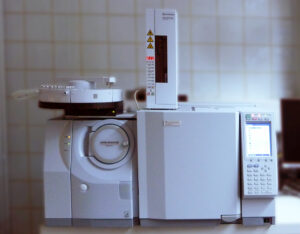
Scientific applications
The Shimadzu QP2010-SE GC-MS is a gas chromatograph single quadrupole mass spectrometer that enables the untargeted or targeted analysis of small molecules that can be evaporated either directly or after prior derivatization. Samples can be of either biological or environmental origin. Biological samples are typically pre-column derivatised to trimethyl silane and O-methyl methoximine derivatives
Technical specifications
Mass range: m/z 1.5 to 1000
Measurable FWHM: 0.5 to 2.0 u
High-speed scan rate: 10000 u/sec




